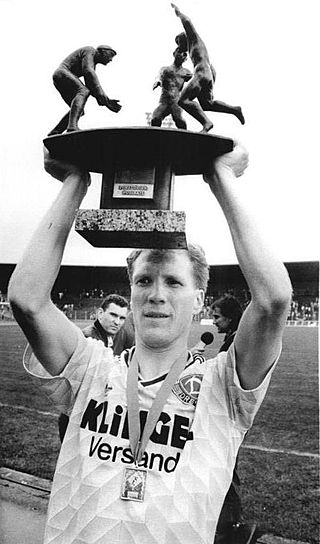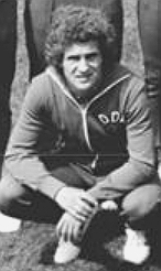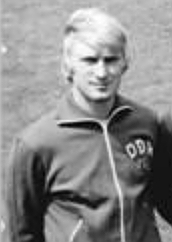
The DDR-Oberliga was the top-level association football league in East Germany.

1. FC Magdeburg is a German Association football club based in Magdeburg. The club was founded in 1965 from the football department of the sports club SC Magdeburg and has been one of the top teams in the DDR-Oberliga, winning three championships and seven cup titles. By winning the European Cup Winners' Cup in 1974, the club became the only East German club to win a European trophy and also achieved the greatest success in its history. After German reunification, the club fell on hard times but returned to professional football in 2015 with the promotion to the 3. Liga. Afterwards the team managed in 2018 to climb up to the second division, in which the team plays today.

The Soviet Union (USSR) competed, for the last time before its dissolution, at the 1988 Summer Olympics in Seoul. 481 competitors, 319 men and 162 women, took part in 221 events in 27 sports. Athletes from 12 of the ex-Soviet republics would compete as the Unified Team at the 1992 Summer Olympics, and each nation would field independent teams in subsequent Games.

The SC Magdeburg is a professional handball club from Magdeburg, Germany. The team plays in the highest German league, the Handball-Bundesliga and regularly in highest international competitions. They won the EHF Champions League in 2002 and 2023, the EHF European League in 1999, 2001, 2007, 2021 and the IHF Men's Super Globe in 2021 and 2022. The governing body of the handball club is a professional multi-sports club and has also departments for: canoe sprint, athletics, rowing, swimming and gymnastics.

The Soviet Union men's national basketball team was the national basketball team that represented the Soviet Union in international competitions. After the dissolution of the Soviet Union in 1991, the successor countries all set up their own national teams.

The FDGB-Pokal was an elimination football tournament held annually in East Germany. It was the second most important national title in East German football after the DDR-Oberliga championship. The founder of the competition was East Germany's major trade union.

The 1984 Friendship Games, or Friendship-84, was an international multi-sport event held between 2 July and 16 September 1984 in the Soviet Union and eight other Eastern Bloc states which boycotted the 1984 Summer Olympics in Los Angeles.

Joachim Streich was a German professional footballer who won the bronze medal with East Germany at the 1972 Summer Olympics in Munich.

Peter Ducke is a German former footballer who played as a forward. He spent most of his career with Carl Zeiss Jena (1959–1977). At international level he played for East Germany national team in 63 matches scoring 15 goals, and was a participant at the 1974 FIFA World Cup. His older brother Roland was also a footballer.
Ingolf Wiegert is a former East German handball player who competed in the 1980 Summer Olympics.

Frank-Michael Wahl is a former German handball player and coach. During his playing career he played for both the DDR and German national team. With DDR competed in the 1980 Summer Olympics and the 1988 Summer Olympics, and with a unified Germany in the 1992 Summer Olympics.
The 1965–66 DDR-Oberliga was the 17th season of the DDR-Oberliga, the first tier of league football in East Germany.

Wolfgang "Maxe" Steinbach is a German former football player and manager who spent most of his career playing for 1. FC Magdeburg in the DDR-Oberliga. At international level, he made 28 appearances for the East Germany national team scoring one goal. In 2006, he was elected Best 1. FC Magdeburg Player of All Times in a telephone vote.

Matthias Liebers is a former German professional footballer.
The 1972–73 season was the 22nd competition for the FDGB-Pokal, the national football cup competition of East Germany.
Günter Pumpel Kubisch was an East German football player.
The 1968-69 season saw the 18th competition for the FDGB-Pokal, the East German national football cup.

Peter Sykora is a former East German association football player who spent the majority of his career with F.C. Hansa Rostock.
The Women's Handball DDR-Oberliga was the highest category in the championship for women's handball in East Germany. Founded in 1951, 41 editions took place before the competition was disestablished in 1991 following the reunification of Germany. SC Leipzig was the championship's most successful with fifteen championships between 1953 and 1991, followed by Fortschritt Weissenfels and Vorwärts Frankfurt with six, TSC Berlin with four and Empor Rostock with three.
The following squads and players competed in the men's handball tournament at the 1988 Summer Olympics.
 East Germany A: [2] Wieland Schmidt, Peter Hofmann — Günter Dreibrodt 6, Peter Rost, Udo Rothe 2/1, Holger Winselmann, Ingolf Wiegert 1, Frank-Michael Wahl 4, Stephan Hauck 3, Dietmar Schmidt, Hartmut Krüger 2, Peter Pysall
East Germany A: [2] Wieland Schmidt, Peter Hofmann — Günter Dreibrodt 6, Peter Rost, Udo Rothe 2/1, Holger Winselmann, Ingolf Wiegert 1, Frank-Michael Wahl 4, Stephan Hauck 3, Dietmar Schmidt, Hartmut Krüger 2, Peter Pysall  Soviet Union: [2] Aleksandr Shypenko, Mikhail Ishchenko — Oleg Gagin 1, Vladimir Belov 1, Mikhail Vasilyev 4, Yuri Shevtsov 2, Sergey Kushniryuk 2, Yuri Kidyaev 2, Aleksandr Rymanov 2, Aleksandr Karshakevich 1, Aleksandr Anpilogov 2/2, Voldemaras Novickis.
Soviet Union: [2] Aleksandr Shypenko, Mikhail Ishchenko — Oleg Gagin 1, Vladimir Belov 1, Mikhail Vasilyev 4, Yuri Shevtsov 2, Sergey Kushniryuk 2, Yuri Kidyaev 2, Aleksandr Rymanov 2, Aleksandr Karshakevich 1, Aleksandr Anpilogov 2/2, Voldemaras Novickis. Péter Kovács (HUN) – 26 goals
Péter Kovács (HUN) – 26 goals Andreas Nagora (DDR B) - 25 goals
Andreas Nagora (DDR B) - 25 goals Daniel Waszkiewicz (POL) – 22 goals
Daniel Waszkiewicz (POL) – 22 goals Roberto Casuso (CUB) – 21 goals
Roberto Casuso (CUB) – 21 goals János Gyurka (HUN) – 21 goals
János Gyurka (HUN) – 21 goals Ingolf Wiegert (DDR) – 20 goals
Ingolf Wiegert (DDR) – 20 goals Yuri Kidyaev (URS) – 16 goals
Yuri Kidyaev (URS) – 16 goals











